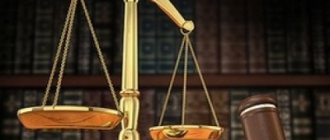Everything about criminal cases
Full list of documents
One of the general rules of investigation is the inadmissibility of conducting investigative actions at night.
(from 22 to 6 o'clock local time) -
Part 3 164 of the Code of Criminal Procedure
. But except in urgent cases. And the “urgency” of these cases remains entirely at the discretion of the investigator.
Very often, interrogations and searches are carried out at night, “strike while the iron is hot” immediately after the arrest. And often the defense refers to this as a violation - after all, the Code of Criminal Procedure says that it is not allowed, why not wait until the morning. But such arguments almost never work in court. It is better for the investigator to know what is urgent and what is not.
In addition, an experienced investigator can play it safe. For example, the person being interrogated is given a quick sign to sign a document indicating he agrees to be interrogated at night. It (consent) is not required according to the Code of Criminal Procedure, but it is better to be “safe than safe.”
The only thing that works well as an argument is holding a court hearing at night. These are the kinds of court decisions that are overturned. Taking into account the workload of the courts, it happens that night hearings are held on “arrest” cases, when the preventive measure chosen is detention. But there is little sense in canceling such a decision - no one will release the arrested person, the case will be sent for a new trial, and the preventive measure will remain the same (due to the public danger of the crime being charged).
Documents for a lawyer (for work at night)
When working at night (from 22.00 to 6.00) for work it is necessary to use two more documents (in addition to the general memo, that is, the Written memo
for the client, explaining his basic rights):
| I. Memo | A reminder about the peculiarities of night time - a memo for the client specifically for night time: this document records in writing the fact that he explained the rights of his client and found out his will to appeal the actions of the investigator, which additionally protects the lawyer from abuse by the client. — a sample of this document can be studied here: Memo to the client about the procedural features of night time. |
| II. Statement | Statement to the investigator against interrogation at night - act of reaction - disagreement with night actions. This document records in writing the fact that the lawyer expressed his position (negative) on this fact. If subsequently the lawyer comes to the need to challenge the actions at night, then this statement will serve as evidence that the legality of these actions was questioned by him even then. Also, in this document, a separate column records in writing the position of the defendant regarding further appeal of investigative actions at night. — a sample of this document can be studied here: Statement to the investigator on the inadmissibility of interrogation at night. |
PECULIARITIES
carrying out investigative actions at night
Purpose of this document
Why additional measures are necessary for night time: here the position of the lawyer is especially vulnerable, he can easily be accused of violating his duties. Therefore, this separate block is required (in addition to general documents).
Url Additional information:
- P.
Plenum No. 19 examples when actions cannot be delayed
— participation of a lawyer in investigative actions at night
possible only in exceptional cases.
According to Part 3 164 of the Code of Criminal Procedure, “Carrying out investigative actions at night is not allowed, except in urgent cases.”
Not an uncommon situation
The defendant is detained, and NOT necessarily at night. But the detainee is kept until nighttime (to “ripen”), and only then the interrogation begins.
According to the general rule, Part 3 164 of the Code of Criminal Procedure
«
Carrying out investigative actions at night is not allowed, except in urgent cases
».
To justify the need for night interrogation, investigators usually refer to Part 2 46 of the Code of Criminal Procedure
interrogation “well, you understand that I am obliged to interrogate within 24 hours.”
Presumption of illegality of night interrogation
| Since there are NO criteria for assessing which cases are considered “urgent”, the lawyer must proceed from the presumption that there is NO reason for an overnight interrogation. That is, you need to react in ANY case. By reaction we mean a written expression of our position—disagreement. If this is not done, then there is a risk of filing claims against the lawyer “did not react, did not take measures to protect, violated clause 1, part 1 7 N 63-ФЗ |
Recommendations for use:
- Conduct a conversation with the defendant.
- hand over a receipt.
— explain its content in simple, accessible language.
— clarify whether the person understands its content. (Clarify meticulously, do not limit yourself to a clear answer “everything is clear”).
- ask to sign, leave 1 copy. to the client, 2nd in the materials of the lawyer's proceedings.
(it is better to call this document a Memo, not a “ receipt”
“, because the term “
receipt
” sounds incorrect).
Memo for the defendant during investigative actions at night
DOWNLOAD simple form: You cannot download files from our server
Recommendations for use:
- Conduct a conversation with the defendant.
- hand over a receipt.
— explain its content in simple, accessible language.
— clarify whether the person understands its content. (Clarify meticulously, do not limit yourself to a clear answer “everything is clear”).
- ask to sign, leave 1 copy. to the client, 2nd in the materials of the lawyer's proceedings.
(it is better to call this document a Memo, not a “ receipt”
“, because the term “
receipt
” sounds incorrect).
PECULIARITIES
carrying out investigative actions at night
Lawyer ________________________ explained to me the specifics of conducting investigative actions at night and the duties of a defense lawyer
- by virtue of clause 21 5 of the Code of Criminal Procedure
night time is considered to be the time period from 22:00 to 6:00 local time.
- according to Part 3 164 of the Code of Criminal Procedure
carrying out investigative actions at
night
is not allowed, except in urgent cases.
- according to part 3 7 of the Code of Criminal Procedure
violation of the norms of the Code of Criminal Procedure by an investigator, an inquiry agency or an interrogating officer during criminal proceedings entails the recognition of
inadmissible
.
A lawyer who begins his defense at night is obliged to:
— find out from the investigator what circumstances motivated the impossibility of carrying out investigative actions during the daytime. If the lawyer considers the investigator’s motivation insufficiently substantiated, he is obliged to express his position, protesting
- ask the client questions - how he feels, whether he is fully aware of what is happening. Assess the physical and psychological state of the defendant - are there any external signs of sleepiness, depression, “confusion” of consciousness. If these signs are present, the lawyer must draw the investigator’s attention to this and make entries in the protocol of the investigative action.
— separately explain to the client the right of the defense party (i.e., the lawyer and the client, both jointly and separately) to file complaints about the illegality of investigative actions at night to the prosecutor’s office in court ( 124 Code of Criminal Procedure
) and to court (
125 Code of Criminal Procedure
).
One copy of this memo was given to me.
______________________________________________________________________________ (full full name, without abbreviations)
__________________________________
Date, hours, minutes – in your own hand
| Note: please note: hours and minutes must be written, and do not forget to check the time indication in the interrogation protocol (other investigative actions). Your conversation with your client should be the first in time, that is, BEFORE the interrogation begins. |
Separately, the position of the defendant regarding the appeal of investigative actions at night to the prosecutor’s office and to the court was clarified ( 124 Code of Criminal Procedure - 125 Code of Criminal Procedure
):
| I wish the lawyer would file a complaint with the prosecutor's office or court. (In this case, the lawyer is obliged to file a complaint no later than 24 hours after the appealed investigative action) | signature ________ |
| I do not want the lawyer to file this complaint with the prosecutor’s office or the court (this does not lose the right to file a complaint at any time, later in person or with a lawyer at the request of the client) | signature ________ |
Note: this column serves the purpose of avoiding contradictions with the client, i.e. the lawyer clearly records his position regarding a possible appeal.
Which eliminates the risk of claims:
- about “ inaction and negligence”
lawyer unless you file a complaint.
— about “ amateur performance”
» lawyer against his will (
clause 2, part 1, 9
CPA).
Return to list of documents
Seek advice
Article 5 of the Code of Criminal Procedure of the Russian Federation. Basic concepts used in this Code
Unless otherwise specified, the basic terms used in this Code have the following meanings:
1) alibi - the location of the suspect or accused at the time of the commission of a crime in another place;
2) appellate instance - a court that considers criminal cases on appeal based on complaints and submissions against sentences, rulings and court decisions that have not entered into legal force;
(as amended by Federal Law dated December 29, 2010 N 433-FZ)
3) close persons - other, with the exception of close relatives and relatives, persons who are related to the victim, witness, as well as persons whose life, health and well-being are dear to the victim, witness due to established personal relationships;
4) close relatives - spouse, parents, children, adoptive parents, adopted children, siblings, grandparents, grandchildren;
5) verdict - a decision on the guilt or innocence of the defendant made by a jury;
6) state prosecutor - an official of the prosecutor's office supporting the prosecution on behalf of the state in court in a criminal case;
(as amended by Federal Laws dated May 29, 2002 N 58-FZ, dated June 5, 2007 N 87-FZ)
7) investigator - an official of the inquiry body, authorized or authorized by the head of the inquiry body to carry out a preliminary investigation in the form of an inquiry, as well as other powers provided for by this Code;
(as amended by Federal Laws dated May 29, 2002 N 58-FZ, dated July 4, 2003 N 92-FZ)
 inquiry is a form of preliminary investigation carried out by an inquiry officer (investigator) in a criminal case in which a preliminary investigation is not necessary;
inquiry is a form of preliminary investigation carried out by an inquiry officer (investigator) in a criminal case in which a preliminary investigation is not necessary;
(as amended by Federal Law dated May 29, 2002 N 58-FZ)
9) pre-trial proceedings - criminal proceedings from the moment of receiving a report of a crime until the prosecutor sends a criminal case to the court for consideration of its merits;
10) dwelling - an individual residential building with residential and non-residential premises included in it, residential premises, regardless of the form of ownership, included in the housing stock and used for permanent or temporary residence, as well as other premises or structure not included in the housing stock, but used for temporary residence;
11) detention of a suspect - a measure of procedural coercion applied by the body of inquiry, inquiry officer, investigator for a period of no more than 48 hours from the moment of actual detention of a person on suspicion of committing a crime;
(as amended by Federal Law dated June 5, 2007 N 87-FZ)
11.1) court conclusion - a conclusion about the presence or absence of signs of a crime in the actions of a person in respect of whom a special procedure for criminal proceedings is applied;
(clause 11.1 introduced by Federal Law dated July 4, 2003 N 92-FZ)
12) legal representatives - parents, adoptive parents, guardians or trustees of a minor suspect, accused or victim, representatives of institutions or organizations in whose care the minor suspect, accused or victim is, guardianship and trusteeship authorities;
(as amended by Federal Law dated July 4, 2003 N 92-FZ)
13) selection of a preventive measure - the adoption by the inquirer, investigator, as well as the court of a decision on a preventive measure in relation to the suspect or accused;
(as amended by Federal Law dated June 5, 2007 N 87-FZ)
13.1) property - any things, including cash and certified securities; non-cash funds held in accounts and deposits with banks and other credit institutions; uncertificated securities, the rights to which are recorded in the register of owners of uncertificated securities or the depository; property rights, including claims and exclusive rights;
(clause 13.1 introduced by Federal Law dated June 29, 2015 N 190-FZ)
14) cassation instance - a court that considers criminal cases in cassation based on complaints and submissions against sentences, rulings and court decisions that have entered into legal force;
(Clause 14 as amended by Federal Law dated December 29, 2010 N 433-FZ)
14.1) control of telephone and other conversations - listening and recording of conversations using any means of communication, inspection and listening to phonograms;
(clause 14.1 introduced by Federal Law dated July 4, 2003 N 92-FZ)
15) the moment of actual detention - the moment of actual deprivation of freedom of movement of a person suspected of committing a crime, carried out in the manner established by this Code;
16) supervisory authority - the Presidium of the Supreme Court of the Russian Federation, which considers criminal cases in the manner of supervision based on supervisory complaints and submissions against sentences, rulings and court decisions that have entered into legal force;
(Clause 16 as amended by Federal Law dated December 29, 2010 N 433-FZ)
17) head of the inquiry body - the official heading the relevant inquiry body, as well as his deputy;
(Clause 17 as amended by Federal Law dated December 30, 2015 N 440-FZ)
17.1) head of the inquiry unit - an official of the inquiry body, heading the corresponding specialized unit that carries out a preliminary investigation in the form of an inquiry, as well as his deputy;
(Clause 17.1 introduced by Federal Law dated 06.06.2007 N 90-FZ)
18) has become invalid. — Federal Law of June 5, 2007 N 87-FZ;
19) urgent investigative actions - actions carried out by the body of inquiry after the initiation of a criminal case, in which a preliminary investigation is mandatory, in order to detect and record traces of a crime, as well as evidence that requires immediate confirmation, seizure and research;
20) non-involvement - unidentified involvement or established non-involvement of a person in the commission of a crime;
21) night time - the period of time from 22 to 6 hours local time;
22) accusation - an allegation that a certain person has committed an act prohibited by criminal law, brought forward in the manner established by this Code;
23) ruling - any decision made collectively by the courts of the first, appellate and cassation instances, with the exception of the verdict and cassation ruling;
(Clause 23 as amended by Federal Law dated December 29, 2010 N 433-FZ)
24) bodies of inquiry - state bodies and officials authorized in accordance with this Code to carry out inquiry and other procedural powers;
24.1) obtaining information about connections between subscribers and (or) subscriber devices - obtaining information about the date, time, duration of connections between subscribers and (or) subscriber devices (user equipment), subscriber numbers, other data allowing to identify subscribers, as well as information about the numbers and location of transceiver base stations;
(clause 24.1 introduced by Federal Law dated 01.07.2010 N 143-FZ)
25) decision - any decision, with the exception of a sentence, made by a single judge; a decision made by the presidium of the court when reviewing the relevant court decision that has entered into legal force; the decision of the prosecutor, the head of the investigative body, the investigator, the inquiry body, the head of the inquiry body, the head of the inquiry unit, the inquirer, made during pre-trial proceedings, with the exception of the indictment, indictment or indictment;
(Clause 25 as amended by Federal Law dated December 30, 2015 N 440-FZ)
26) presiding judge - a judge who presides over a court hearing during a collegial consideration of a criminal case, as well as a judge considering a criminal case alone;
27) presentation - an act of the prosecutor’s response to a court decision, submitted in the manner established by this Code;
28) verdict - a decision on the innocence or guilt of the defendant and the imposition of punishment on him or on his release from punishment, made by the court of first instance or appeal;
29) application of a preventive measure - procedural actions carried out from the moment the decision is made to select a preventive measure until its cancellation or change;
30) juror - a person invited in the manner prescribed by this Code to participate in the trial and render a verdict;
31) prosecutor - the Prosecutor General of the Russian Federation and the prosecutors subordinate to him, their deputies and other officials of the prosecutor's office participating in criminal proceedings and vested with the corresponding powers by the federal law on the prosecutor's office;
(Clause 31 as amended by Federal Law No. 92-FZ dated 04.07.2003)
32) procedural action - investigative, judicial or other action provided for by this Code;
33) procedural decision - a decision made by the court, prosecutor, investigator, inquiry body, head of the inquiry body, head of the inquiry unit, investigator in the manner established by this Code;
(as amended by Federal Law dated December 30, 2015 N 440-FZ)
34) rehabilitation - the procedure for restoring the rights and freedoms of a person illegally or unreasonably subjected to criminal prosecution, and compensation for the harm caused to him;
35) rehabilitated - a person who, in accordance with this Code, has the right to compensation for damage caused to him in connection with illegal or unfounded criminal prosecution;
36) remark - a remark by a participant in the debate of the parties regarding what was said in the speeches of other participants;
36.1) results of operational-search activities - information received in accordance with the federal law on operational-search activities, about the signs of a crime being prepared, being committed or completed, persons preparing, committing or having committed a crime and hiding from the bodies of inquiry, investigation or court;
(clause 36.1 introduced by Federal Law dated 04.07.2003 N 92-FZ)
37) relatives - all other persons, with the exception of close relatives, who are related;
38) investigative measures - measures taken by the inquirer, investigator, as well as the body of inquiry on behalf of the inquirer or investigator to identify a person suspected of committing a crime;
38.1) head of the investigative body - the official heading the relevant investigative unit, as well as his deputy;
(Clause 38.1 introduced by Federal Law dated 06/05/2007 N 87-FZ)
39) has become invalid. — Federal Law of June 5, 2007 N 87-FZ;
40) witness immunity - the right of a person not to testify against himself and his close relatives, as well as in other cases provided for by this Code;
(as amended by Federal Law dated May 29, 2002 N 58-FZ)
40.1) forensic investigator - an official authorized to carry out a preliminary investigation in a criminal case, as well as to participate, on behalf of the head of the investigative body, in the production of certain investigative and other procedural actions or to carry out certain investigative and other procedural actions without accepting the criminal case for their proceedings;
(clause 40.1 introduced by Federal Law dated December 2, 2008 N 226-FZ)
41) investigator - an official authorized to carry out a preliminary investigation in a criminal case, as well as other powers provided for by this Code;
(as amended by Federal Law dated May 29, 2002 N 58-FZ)
41.1) consent - permission from the head of the investigative body for the investigator to carry out or permission from the prosecutor, the head of the inquiry body for the investigator to carry out relevant investigative and other procedural actions and for them to make procedural decisions;
(clause 41.1 introduced by Federal Law dated June 5, 2007 N 87-FZ; as amended by Federal Law dated December 30, 2015 N 440-FZ)
42) detention - the stay of a person detained on suspicion of committing a crime, or an accused person to whom a preventive measure in the form of detention has been applied, in a pre-trial detention center or other place determined by federal law;
43) report of a crime - a statement of a crime, a confession, a report on the discovery of a crime;
44) specialized institution for minors - a specialized state body that ensures the correction of minors and was created in accordance with federal law;
45) parties - participants in criminal proceedings, performing on the basis of adversarial function the function of prosecution (criminal prosecution) or defense against accusation;
46) defense party - the accused, as well as his legal representative, defense attorney, civil defendant, his legal representative and representative;
47) the prosecution - the prosecutor, as well as the investigator, the head of the investigative body, the investigator, the head of the inquiry unit, the head of the inquiry body, the inquiry body, the private prosecutor, the victim, his legal representative and representative, the civil plaintiff and his representative;
(as amended by Federal Laws No. 58-FZ dated May 29, 2002, No. 87-FZ dated June 5, 2007, No. 440-FZ dated December 30, 2015)
48) court - any court of general jurisdiction that considers a criminal case on the merits and makes decisions provided for by this Code;
49) forensic examination - an examination carried out in the manner established by this Code;
50) court session - a procedural form of administration of justice during pre-trial and judicial proceedings in a criminal case;
51) trial - a court hearing of the courts of the first, second, cassation and supervisory instances;
(Clause 51 as amended by Federal Law dated December 29, 2010 N 433-FZ)
52) court of first instance - a court that considers a criminal case on the merits and is competent to pass a verdict, as well as make decisions during pre-trial proceedings in a criminal case;
53) court of second instance - court of appeal;
(Clause 53 as amended by Federal Law dated December 29, 2010 N 433-FZ)
53.1) judicial decision - a sentence, ruling, decision made during criminal proceedings in the courts of the first and second instances; ruling and resolution issued during criminal proceedings in a court of cassation; a decision made during criminal proceedings in a supervisory court;
(clause 53.1 introduced by Federal Law dated December 29, 2010 N 433-FZ)
53.2) final judicial decision - a sentence, another court decision made during the trial, by which a criminal case is resolved on the merits;
(clause 53.2 introduced by Federal Law dated December 29, 2010 N 433-FZ)
53.3) interim court decision - all rulings and decisions of the court, with the exception of the final court decision;
(clause 53.3 introduced by Federal Law dated December 29, 2010 N 433-FZ)
54) judge - an official authorized to administer justice;
55) criminal prosecution - procedural activity carried out by the prosecution in order to expose a suspect accused of committing a crime;
56) criminal proceedings - pre-trial and judicial proceedings in a criminal case;
57) criminal law - the Criminal Code of the Russian Federation;
58) participants in criminal proceedings - persons taking part in criminal proceedings;
59) private prosecutor - the victim or his legal representative and representative in criminal cases of private prosecution;
60) expert institution - a state forensic expert or other institution entrusted with the conduct of a forensic examination in the manner established by this Code;
61) pre-trial cooperation agreement - an agreement between the parties to the prosecution and defense, in which these parties agree on the terms of liability of the suspect or accused depending on his actions after the initiation of a criminal case or the filing of charges;
(Clause 61 introduced by Federal Law dated June 29, 2009 N 141-FZ)
62) teacher - a pedagogical worker who performs responsibilities for training and education of students in an educational organization or organization providing training.
(Clause 62 introduced by Federal Law dated July 2, 2013 N 185-FZ)
Previous article | Code of Criminal Procedure of the Russian Federation | Next article





